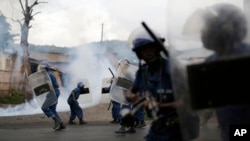The East Africa region has responded with deafening silence to protests across Burundi against President Pierre Nkurunziza, which entered their fourth day Wednesday.
At least two people protesting Nkurunziza's decision to run for a third term have been shot dead and the government closed down media houses in the country, but Burundi’s neighbors have yet to utter a word.
There has been no official statement from Kenya or Uganda. Rwanda, which has taken in more than 20,000 refugees fleeing the violence, also has remained silent. And the East Africa Community, a regional grouping of which Burundi is a member, has not yet released a statement.
Sarah Jackson, deputy regional director for East Africa at Amnesty International, told VOA she would like to see a stronger regional response.
"We would like to see concerted action from the East African Community as well," she said. "Their silence is quite notable, given the current situation. But it’s also possible that they’re working multilaterally through the African Union to have a continent-level response.”
The African Union announced Tuesday that it would send a high-level delegation to Burundi to try to ease tension in the country. The representatives have not yet been named.
Jackson said Amnesty had welcomed the AU’s involvement throughout the crisis. “We know that the African Union has been engaged behind the scenes on the situation in Burundi for some time, and we are pleased to see them take a more public approach to this work,” she said.
Burundi’s Senate has asked the country’s constitutional court to take up the issue of whether Nkurunziza is eligible to run for another term.
The president and his supporters argue that because he was elected by parliament in 2005, he can run again, since the constitution states the president must be elected through “direct suffrage,” interpreted to mean a popular vote. But protesters argue that this violates the 2000 Arusha Accord, an agreement that ended the country’s civil war and explicitly limits the president to two terms in office.
AU Chairperson Nkosazna Dlamini-Zuma has welcomed the decision to take the dispute to court.
AU spokesman Jacob Eben said Tuesday that the chairperson has always maintained the matter should be settled by Burundi’s own legal processes.
“The very strong recommendation for the chairperson is they should approach those institutions," Eben said. Misunderstandings or differences in interpretation of the laws should be taken to the constitutional court, he said.
Protests continued Wednesday around Bujumbura, the capitall, but with less intensity than in previous days.
The government, which already closed down several radio stations in the country, has also reportedly cut off access to social media messaging services, including Facebook and WhatsApp.




